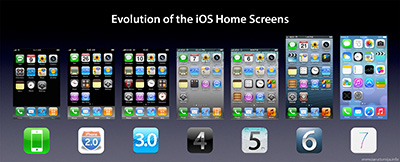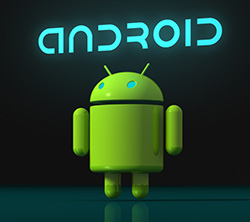
iOS (previously iPhone OS) is a mobile operating system developed and distributed by Apple Inc. Originally unveiled in 2007 for the iPhone, it has been extended to support other Apple devices such as the iPod Touch (September 2007), iPad (January 2010), iPad Mini (November 2012) and second-generation Apple TV (September 2010). Unlike Microsoft's Windows Phone and Google's Android, Apple does not license iOS for installation on non-Apple hardware. As of August 2013, Apple's App Store contained more than 900,000 iOS applications, 375,000 of which were optimised for iPad. These apps have collectively been downloaded more than 50 billion times. It had a 21% share of the smartphone mobile operating system units shipped in the fourth quarter of 2012, behind only Google's Android. In June 2012, it accounted for 65% of mobile web data consumption (including use on both the iPod Touch and the iPad). At the half of 2012, there were 410 million devices activated. According to the special media event held by Apple on September 12, 2012, 400 million devices had been sold by June 2012.
The user interface of iOS is based on the concept of direct manipulation, using multi-touch gestures. Interface control elements consist of sliders, switches, and buttons. Interaction with the OS includes gestures such as swipe, tap, pinch, and reverse pinch, all of which have specific definitions within the context of the iOS operating system and its multi-touch interface. Internal accelerometers are used by some applications to respond to shaking the device (one common result is the undo command) or rotating it in three dimensions (one common result is switching from portrait to landscape mode).
iOS is derived from OS X, with which it shares the Darwin foundation and various application frameworks. iOS is Apple's mobile version of the OS X operating system used on Apple computers.

Android is an operating system based on the Linux kernel, and designed primarily for touchscreen mobile devices such as smartphones and tablet computers. Initially developed by Android, Inc., which Google backed financially and later bought in 2005, Android was unveiled in 2007 along with the founding of the Open Handset Alliance: a consortium of hardware, software, and telecommunication companies devoted to advancing open standards for mobile devices. The first Android-powered phone was sold in October 2008.
The user interface of Android is based off direct manipulation, using touch inputs that loosely correspond to real-world actions, like swiping, tapping, pinching and reverse pinching to manipulate on-screen objects. Internal hardware such as accelerometers, gyroscopes and proximity sensors are used by some applications to respond to additional user actions, for example adjusting the screen from portrait to landscape depending on how the device is oriented. Android allows users to customize their homescreens with shortcuts to applications and widgets, which allow users to display live content, such as emails and weather information, directly on the homescreen. Applications can further send notifications to the user to inform them of relevant information, such as new emails and text messages.
Android is open source and Google releases the code under the Apache License. This open-source code and permissive licensing allows the software to be freely modified and distributed by device manufacturers, wireless carriers and enthusiast developers. Additionally, Android has a large community of developers writing applications ("apps") that extend the functionality of devices, written primarily in a customized version of the Java programming language. In October 2012, there were approximately 700,000 apps available for Android, and the estimated number of applications downloaded from Google Play, Android's primary app store, was 25 billion. A developer survey conducted in April–May 2013 found that Android is the most popular platform for developers, used by 71% of the mobile developer population.
These factors have contributed towards making Android the world's most widely used smartphone platform, overtaking Symbian in the fourth quarter of 2010, and the software of choice for technology companies who require a low-cost, customizable, lightweight operating system for high tech devices without developing one from scratch. As a result, despite being primarily designed for phones and tablets, it has seen additional applications on televisions, games consoles, digital cameras and other electronics. Android's open nature has further encouraged a large community of developers and enthusiasts to use the open-source code as a foundation for community-driven projects, which add new features for advanced users or bring Android to devices which were officially released running other operating systems.
Android's share of the global smartphone market, led by Samsung products, was 64% in March 2013. The operating system's success has made it a target for patent litigation as part of the so-called "smartphone wars" between technology companies. As of May 2013, 48 billion apps have been installed from the Google Play store, and as of September 3, 2013, 1 billion Android devices have been activated.
Back To Top